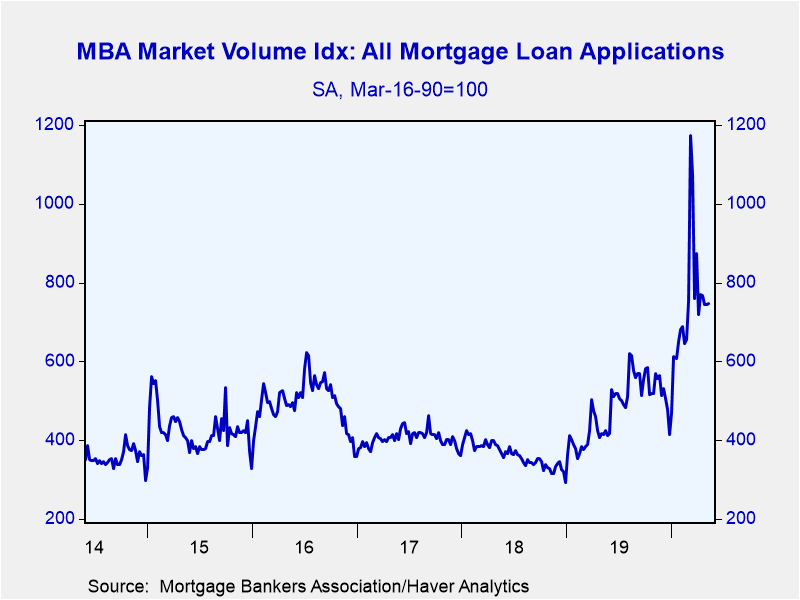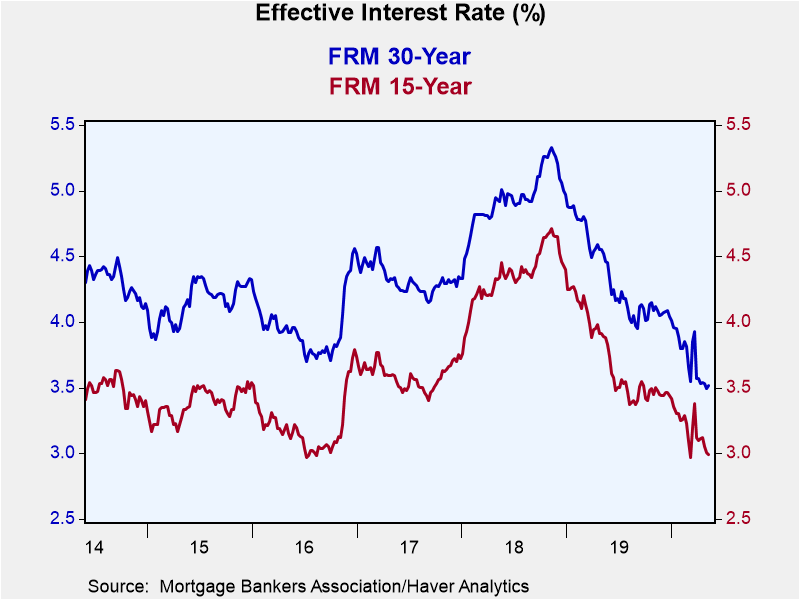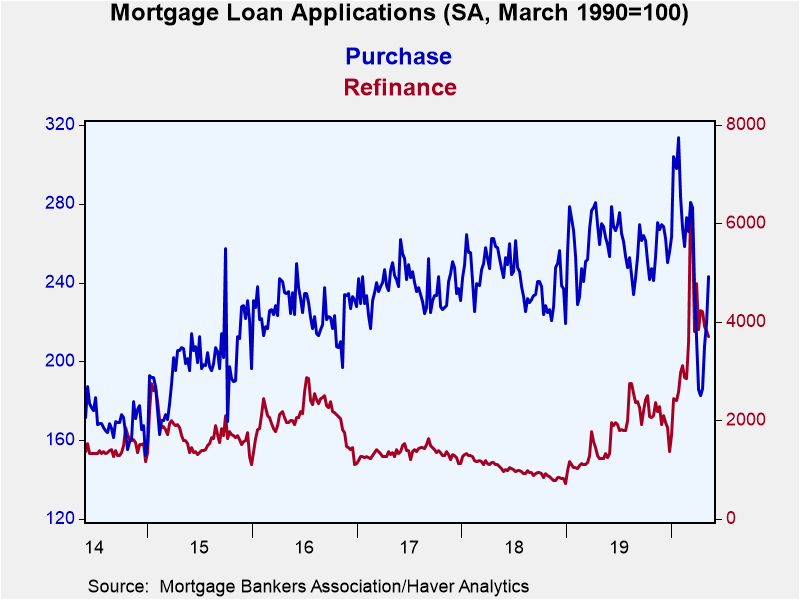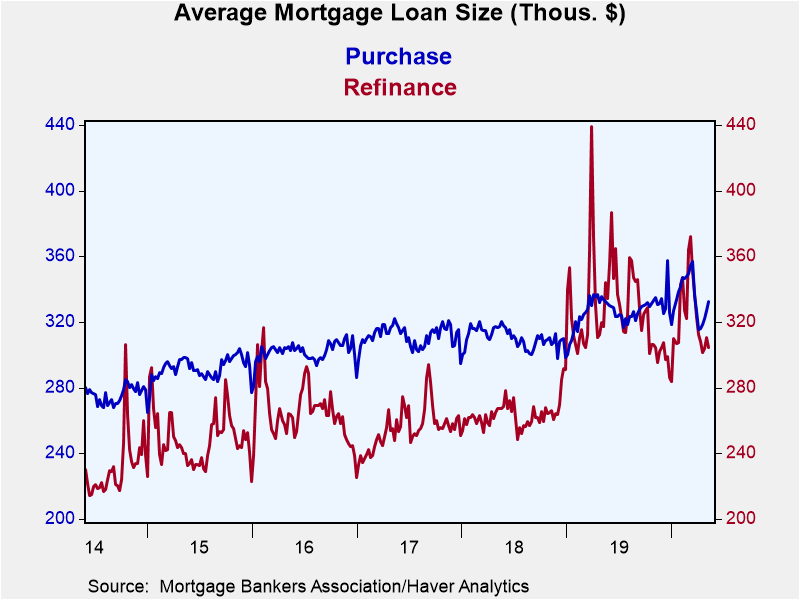 Global| May 13 2020
Global| May 13 2020U.S. Mortgage Applications Edge Up
by:Sandy Batten
|in:Economy in Brief
Summary
• Financing rates remain near record lows. • Purchase volume rose for fourth consecutive week while refinancings faded further. The Mortgage Bankers Association reported that its Mortgage Loan Application Index edged up 0.3% w/w [...]
• Financing rates remain near record lows.
• Purchase volume rose for fourth consecutive week while refinancings faded further.
The Mortgage Bankers Association reported that its Mortgage Loan Application Index edged up 0.3% w/w (+70.3% y/y) in the week ended May 8 versus a 0.1% rise in the previous week. The little change in overall activity again reflected a continued rebound in purchase activity but a further decline in refinancings. The rebound in purchases was relatively widespread as most of the large states experienced increases with some posting double-digit gains, led by a 14% w/w jump in New York state. Applications for purchase rose for the fourth consecutive week, increasing 10.6% w/w (-9.5% y/y) after a 5.8% w/w increase in the previous week as they continue to recover from a nearly five-year low. There appears to be some pent-up demand for home purchases as some states begin to reopen.
Applications for refinancing fell for the fourth consecutive week, declining 3.3% w/w (+200.9% y/y) after a 1.7% w/w decline in the previous week. The refinancing share of mortgage activity decreased to 67.0% of total applications from 70.0% the previous week. The adjustable-rate mortgage (ARM) share of activity increased to 2.9% of total applications.
The effective interest rate on a 15-year fixed-rate mortgage fell to2.99% in the week ended May 8 from 3.01% in the previous week. This rate is now within two basis points of an all-time low for this series (dating back to 1990). The effective interest rate on the 30-year fixed-rate mortgage increased to 3.52% after having declined to 3.49 in the previous week, a record low for the series. The effective rate on a 30-year Jumbo mortgage edged down to 3.78% from 3.79%. The rate on the 5-year adjustable rate mortgage fell to 3.28% from 3.33%.
The average mortgage loan size slipped to $313,600 from $315,400. The average loan size of refinancings fell to $304,400 from $310,500. The average loan size for purchases rose to $332,300 from $326,800.
Home buyers and owners continue to lock in currently low levels of interest rates. Applications for fixed-rate loans increased 86.2% y/y, while applications for adjustable rate loans fell 18.7% y/y.
The survey covers over 75% of all U.S. retail residential mortgage applications and has been conducted weekly since 1990. Respondents include mortgage bankers, commercial banks and thrifts. The base period and value for each index is March 16, 1990=100. The figures for weekly mortgage applications and interest rates are available in Haver's SURVEYW database.
| MBA Mortgage Applications (%, SA) | 05/08/20 | 05/01/20 | 04/24/20 | Y/Y | 2019 | 2018 | 2017 |
|---|---|---|---|---|---|---|---|
| Total Market Index | 0.3 | 0.1 | -3.3 | 70.3 | 32.4 | -10.4 | -17.8 |
| Purchase | 10.6 | 5.8 | 11.6 | -9.5 | 6.6 | 2.1 | 5.6 |
| Refinancing | -3.3 | -1.7 | -7.3 | 200.9 | 71.1 | -24.3 | -34.0 |
| 15-Year Effective Mortgage Interest Rate (%) | 2.99 | 3.01 | 3.05 | 3.89 | 3.71 | 4.35 | 3.59 |
| 30-Year Effective Mortgage Interest Rate (%) | 3.52 | 3.49 | 3.53 | 4.52 | 4.34 | 4.94 | 4.32 |
Sandy Batten
AuthorMore in Author Profile »Sandy Batten has more than 30 years of experience analyzing industrial economies and financial markets and a wide range of experience across the financial services sector, government, and academia. Before joining Haver Analytics, Sandy was a Vice President and Senior Economist at Citibank; Senior Credit Market Analyst at CDC Investment Management, Managing Director at Bear Stearns, and Executive Director at JPMorgan. In 2008, Sandy was named the most accurate US forecaster by the National Association for Business Economics. He is a member of the New York Forecasters Club, NABE, and the American Economic Association. Prior to his time in the financial services sector, Sandy was a Research Officer at the Federal Reserve Bank of St. Louis, Senior Staff Economist on the President’s Council of Economic Advisors, Deputy Assistant Secretary for Economic Policy at the US Treasury, and Economist at the International Monetary Fund. Sandy has taught economics at St. Louis University, Denison University, and Muskingun College. He has published numerous peer-reviewed articles in a wide range of academic publications. He has a B.A. in economics from the University of Richmond and a M.A. and Ph.D. in economics from The Ohio State University.
More Economy in Brief
 Global| Feb 05 2026
Global| Feb 05 2026Charts of the Week: Balanced Policy, Resilient Data and AI Narratives
by:Andrew Cates










